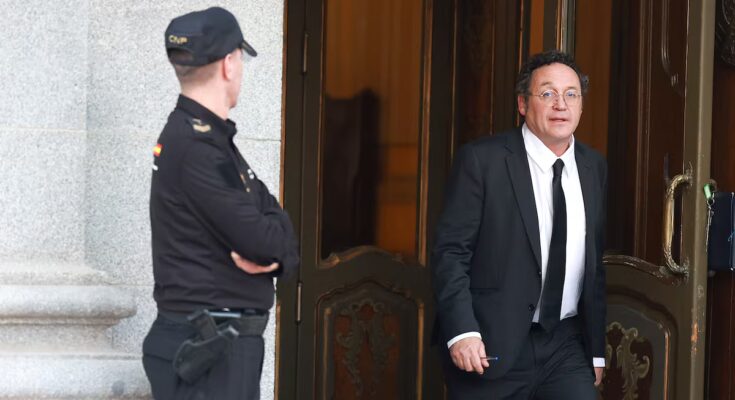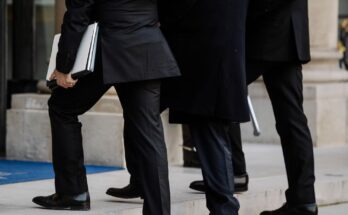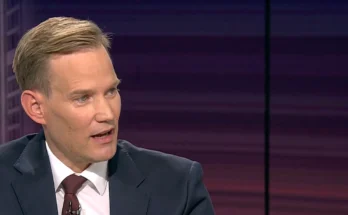Álvaro García Ortiz took off his robe before descending from the podium which he shared in recent days with the state’s lawyers and prosecutors. Already dressed in civilian clothes, he sat in an armchair before the seven judges of the Second Section of the Supreme Court who tried him for revealing secrets. That same place had been occupied by the witnesses cited in recent days, but seeing the State Attorney General there, now without the symbols of the office, offered this Wednesday, for the first time since the start of the trial, the physical image of a man in the dock.
Over the next 45 minutes, García Ortiz gave his version of the events that led him there. He again denied having leaked to the press the email in which the lawyer of Alberto González Amador, partner of Isabel Díaz Ayuso, confessed his fraud to the Treasury Ministry before the Madrid Prosecutor’s Office for economic crimes. And he justified all his actions as an attempt to preserve the honor of the Prosecutor’s Office in the face of the “insidiousness” and “slander” put into circulation by the Madrid president’s entourage.
Before declaring himself innocent, García Ortiz had to accept the only testimony of the entire trial that clearly indicated him as guilty. It was presented by UCO agents, who appeared to be led by the head of the economic crime area, Antonio Balas. It is not that this Civil Guard unit, already present in all the major scandals in the country, has found evidence of the accusation that had never appeared. But, as he had already done in the reports provided during the investigation, he concludes that the leak was García Ortiz based on “inferences”. Temporary coincidences, in short. The interrogation of Balas’ team by State Attorney Consuelo Castro provided one of the highlights of this historic trial. Castro tried to dismantle the civil guard’s conclusions by sarcastically repeating the word “inferences” and trying to demonstrate that they were only “interpretations”. In the midst of the dialectical struggle, Balas, irritated at finding himself in question, summarizes the fundamental element on which he relies to blame the public prosecutor:
-Everything that was leaked was after being in the possession of the State Attorney General’s Office.
-From the Attorney General’s Office and 600 other people- Castro responded, alluding to the fact that the documents in question were deposited in various generic email addresses of the Prosecutor’s Office and the State Attorney’s Office.
García Ortiz’s statement closed the testimony phase of the trial which will be held next Thursday for the sentence after the parties presented have presented their final reports. It was assumed that the prosecutor would not submit to the interrogations of the four popular charges, but the question remained whether he would do so in front of the lawyer representing González Amador. He avoided it. And he justified it because Ayuso’s partner was “disloyal” in the complaint filed against him. For example, it claims to ask for compensation of 300,000 euros and does not even invoke the possible subsidiary civil liability of the State in the event of non-payment. Although he declared himself willing to answer any questions posed to him by the members of the court, none of them bothered. So García Ortiz elaborated his version based on the questions of one of the state lawyers who defended him, José Ignacio Ocio.
The interrogation, of course, was white glove. The lawyer asked the head of the Public Prosecution to defend himself against some of the elements that were presented as evidence to proceed against him. The most repeated, erasing your electronic devices. At that point he denied having deleted on 16 October 2024, at the time in which the Supreme Court accused him, the messages and communications from the days of the previous March, when the events had occurred. This was suggested in one of the UCO reports. García Ortiz claims that for security reasons he always “periodically and systematically” deletes the history of his electronic terminals. And that the messages from those days according to which the charges presented as destruction of evidence had been suppressed months earlier. The defense had previously called into question two IT experts who had certified that it is not possible to establish “which, how many and on what date” the different messages were deleted.
The defendant also complained that the UCO had told him that it had deleted his Gmail account in which he had received the alleged leaked email on the night of March 13, 2024. García Ortiz claimed that this account was fully operational when the Guardia Civil searched his office on October 30 last year. Furthermore, the agents recorded that email address in one of their reports to the investigating judge. That report, part of this case that put unusual zeal into investigating a leak, was also leaked. Following that disclosure, he adds, he began receiving threatening messages – displayed on screens in the courtroom – and decided to close the account.
The lawyer also helped him defend himself against some accusations made against him by the highest prosecutor’s office in Madrid. Almudena Lastra said last week that she told García Ortiz “hai tu” or “hai tu” – she doesn’t remember exactly how – “filtered the email” and that he ignored her: “It doesn’t matter now.” The prosecutor said he had no memory of that conversation and that Lastra herself did not comment on the incident when she gave her statement for the first time before the Superior Court of Madrid. In his previous testimony before the investigating judge, García Ortiz had implied that Lastra professed “animosity” towards him. Now he says he regrets saying it. But at the same time he did not fail to underline his “obstructionist attitude” towards his instructions to deny the hoaxes of Miguel Ángel Rodríguez, Ayuso’s chief of staff.
The accused claimed that his only “obsession” in those days of March was to “defend the absolutely impeccable performance” of his subordinates at the Madrid Prosecutor’s Office in the complaint against Ayuso’s boyfriend for defrauding the treasury of 350,000 euros. An “institutional response” to Rodríguez’s falsehoods about González Amador’s negotiations with the Prosecutor’s Office and to the declarations of the president of Madrid herself, who attributed everything, García Ortiz underlined, to “political persecution”. For his last words he chose a phrase that, according to what he said, someone had said to him in the corridor before entering: “The truth does not leak out, the truth defends itself.”
Before the defendant’s testimony, in the early afternoon, the view had been monopolized throughout the morning by the appearance of the UCO agents. Both those who participated in the ten-hour search of García Ortiz’s office, and those who drew up reports for the judge based on communications intercepted by the Madrid provincial prosecutor, Pilar Rodríguez. The accusers, who arrived empty-handed the day before, found themselves this Wednesday with a great gift. Until now, no testimony had been heard as direct against the accused as that presented by the three-member expert panel of that Civil Guard unit, led by Lieutenant Colonel Balas.
The defense asked the court to cancel the search at the prosecutor’s office, arguing that it violated fundamental rights and was not motivated. To this end, he explained to the experts that the investigating judge, Ángel Hurtado, had asked to seize the communications between March 7 and October 30, 2024, but they seized them all. The agents indicated that it was technically not possible to do otherwise and that in the subsequent analysis they stuck to the established deadline. When the lawyer Castro asked Balas if they had asked the judge for permission to exceed the deadline, he confessed: “I don’t remember.”
Sparks flew between Castro and Balas. The lieutenant colonel did not hesitate to attribute to the prosecutor’s office not only the leak now under investigation, but also the first news of the complaint against Ayuso’s boyfriend. Your argument? Which in both cases the media published it after the documents arrived at the Public Prosecutor’s Office. It was then that Castro responded that many other people could have access to those same documents. And he asked why they hadn’t investigated the generic emails where they had been deposited. “Why don’t we do prospective research,” Balas responded. The audience, made up mostly of prosecutors close to the defendants, burst into laughter.
Balas identified the leak in the note published on the Cadena SER website at 11.51pm. on March 13, which for the first time included verbatim quotes from the aforementioned email. The author of the information, Miguel Ángel Campos, denies that his source was García Ortiz. The UCO claims the opposite and attaches importance to the fact that in the report of the public prosecutor’s call there is one from Campos lasting four seconds. The journalist believes that it must correspond to the answering machine skipping, because García Ortiz did not answer or return the call.
In justifying how he had deduced the authorship of the leak, the head of the UCO referred indifferently to the institution, the Attorney General’s Office, or its top executive. Castro then asked him what he based on to personalize it in García Ortiz. He responded with another deduction: “Because the Prosecutor’s Office is a hierarchical institution.”



